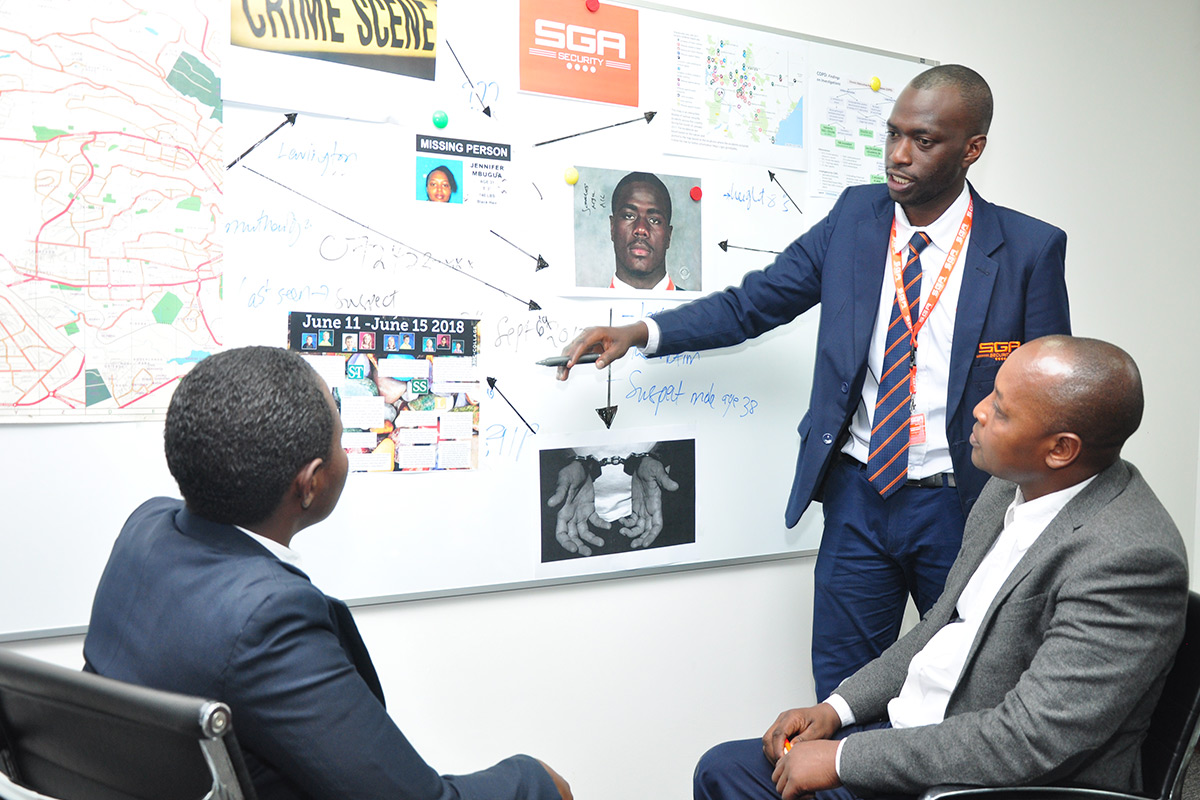- Home
- About Us
- Services
- Our Clients
- CSR
- SGA Security Kenya Visit to Wings of Hope Rescue Home
- SGA SECURITY CHAMPIONS SUSTAINABILITY THROUGH RECYCLING OF OLD GUARDS’ UNIFORMS INTO SCHOOL BAGS
- SGA SECURITY UGANDA ADVOCATES FIGHTING AGAINST BREAST CANCER
- SGA SECURITY KENYA SPONSORS THE 2023 AFRICA CONCOURS D’ELEGANCE
- SGA Security Sponsors Car No.7 Ahead of The Rhino Charge Competition
- SGA SECURITY PARTNERS WITH AFRICA COLLECT TEXTILES TO RE-USE GUARDS’ UNIFORMS INTO SCHOOL BAGS
- WAFANYAKAZI WA KIKE WA KAMPUNI YA SGA WATOA MSAADA WA VIFAA HOSPITALI YA OCEAN ROAD
- Security firm sponsors The Great African Cycling safari
- Contacts
- Careers
- News


Strengthening business performances through specialized Corporate Intelligence and Investigations In Kenya and East Africa in general
February, 2019
In the recent past, the need to search for and recover information and assets, assess employee misconduct or investigate accounting fraud has led a wide range of clientele to one of the most sought-after services in the industry- Corporate Intelligence and Investigations In Kenya and East Africa in general.
SGA Intelligence and Investigations Unit is among the facilities in the Department of Specialized Services that employs research and investigative techniques to establish facts required to pursue the truth of a particular matter on behalf of a client. Services offered are anti-corruption advisory, auditing services, misconduct and bribery investigations, fraud risk management advisory services, investigative due diligence and email investigative services among others.
SGA Security Manager Peter Kinyanjui explains that the aspect of carrying out intelligence services seeks to support clients that are confronted by problems and issues that may threaten the integrity and well-being of their organisations. These threats include among others actual or suspected internal fraud, confidentiality leaks, management acting in breach of a contractual agreements or anticipated litigation such as lawsuits on theft.
Intelligence is usually related to preventing matters such as procurement breach, background checks of an employee and due diligence of any particular case under investigation. This means that his department extensively gathers information about companies and individuals of interest on behalf of clients.
“Depending on the particular case being pursued, our team members engage in conducting detailed research from vast data resources such human source intelligence , Open Source Intelligence , Social Media Intelligence and also Strategic Intelligence where information is obtained organizations,” says Mr. Kinyanjui.
The research data will then be analysed and thereafter decisions will be made ensuring that the data is treated with confidentiality in order to meet the case objectives. In some instances, the Intelligence Department is formally engaged by a client’s external counsel to integrate gathered information and form a strategic resolution.
At SGA, the investigative projects, which are based on reactive matters, involves a broad range of portfolio as requested by clients for the sake of understanding the legal, commercial or reputational background of a subject of interest such as a potential business partner. First and foremost, internal investigations constitute the review and analysis or tracing of questionable financial accounting, performance of in-depth interviews of key personnel and electronic discovery of lost documents. Other investigative work spreads to cyber-crimes, legal disputes, money laundering or securities fraud, crisis management, forensic data analytics, theft of intellectual property and corruption investigations. In matters requiring legal address, the team works hand in hand with the Government in the case where they are required to present evidence in court during case hearing.
Mr. Kinyanjui, who has a background in Forensic Audits and Investigations, adds that the Intelligence Unit has a team of knowledgeable investigators with a wide range of experience and backgrounds from forensic accountants, lawyers, former regulators and law enforcement, data analysts and e-Discovery specialists, who are dispatched to various organizations to protect clients’ assets.
The Investigative and Intelligence department at SGA has developed an incident response methodology to enable the team rapidly and effectively respond to arising investigation cases. With the past experience working with clients in broad categories, the team uses the findings on these investigations to make recommendations to our clients on how to strengthen compliance frameworks.
“In a nutshell, we work with firms to enhance good governance through ensuring that the Board of Directors has clear organizational structures by conducting and managing risks in order to review their effectiveness in communication and transparency. This can only be effective through extensive intelligence and investigative skills,” Mr. Kinyanjui emphasizes.
With the continuous advance in technology, investigative due diligence model is slowly moving from the extensive use of the ‘traditional’ human source intelligence and is slowly moving to electronic data-centric especially in tackling cyber-crimes and forensic accounting as well as the use of emails to gather evidence. However, human sources remain important in giving first-hand information.
“All companies across all industries should consider incorporating intelligence and investigative services in their agenda by thinking through various investigative scenarios to be better prepared when the inevitable happens,” concludes Mr. Kinyanjui.
